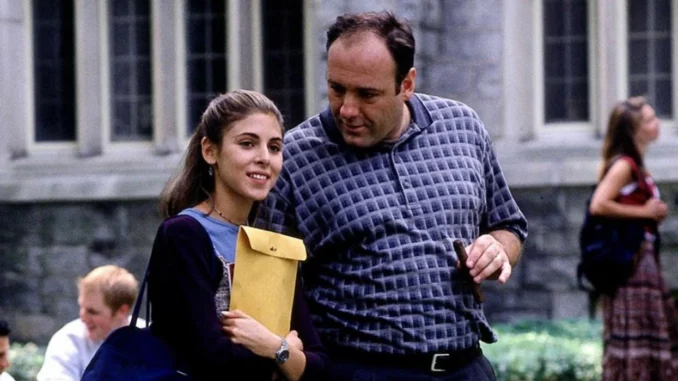
When The Sopranos premiered on HBO in January 1999, few could have predicted the seismic shift it would create in the landscape of television. But it was the fifth episode, “College,” that truly redefined what audiences could expect from the medium. In just one hour, the episode explored complex themes of identity, morality, and the dual lives we all lead, laying the groundwork for the antihero trend that dominates modern television.
The Premise: A Family Outing with a Dark Twist
In “College,” we see mob boss Tony Soprano (played masterfully by James Gandolfini) taking his daughter Meadow (Jamie-Lynn Sigler) on a college tour. On the surface, it seems like a typical family outing. However, the episode quickly spirals into a tension-filled narrative when Tony unexpectedly spots an FBI informant who has put several of his friends behind bars. This moment sets off a chain of events that showcases not just Tony’s violent tendencies, but also his struggles as a father trying to maintain some semblance of normalcy in his chaotic life.
A Show That Went Beyond the Mob
While many initially viewed The Sopranos as just another mob drama, “College” revealed the show’s true depth. It wasn’t merely about organized crime; it explored the complexities of family dynamics, personal identity, and moral ambiguity. Tony’s simultaneous roles as a father and a mobster created a captivating juxtaposition that made audiences question their own values.
The brilliance of this episode lies in how it frames Tony as both a monster and a relatable figure. He’s a loving dad, yet he’s capable of horrific violence. This duality forced viewers to confront the uncomfortable truth that people are rarely just one thing. By the end of the episode, the lines between right and wrong, love and hate, become disturbingly blurred.
Character Complexity: The Birth of the Antihero
In “College,” viewers are introduced to a new kind of television protagonist: the antihero. Tony Soprano is not your typical leading man. He’s violent, manipulative, and morally bankrupt, yet the show invites us to empathize with him. This emotional complexity was groundbreaking for television, paving the way for other flawed characters like Walter White in Breaking Bad and Dexter Morgan in Dexter.
Meadow and the Quest for Truth
Throughout the episode, Meadow’s innocent inquiries about her father’s life serve as a narrative device that reveals deeper family secrets. At one point, she asks Tony if he’s in the Mafia. His clumsy denial—that he’s merely in the “waste management business”—is both hilarious and telling. It encapsulates the denial that many families experience when grappling with difficult truths.
As Meadow confesses to her father that she and her friends have tried drugs, the irony isn’t lost on viewers. Tony’s immediate outrage contrasts sharply with his own illicit activities, further emphasizing the show’s theme of hypocrisy within families. It’s a tightrope walk of emotions, making us reflect on the secrets we keep from our loved ones.
A Gripping Climax: The Violent Resolution
The climax of “College” is one of the most gripping moments in television history. After confronting the informant, Tony takes matters into his own hands in a brutal, unflinching manner. What unfolds is a harrowing depiction of violence that juxtaposes Tony’s nurturing side as a father.
The Complexity of Love and Violence
Tony’s brutal act of killing the informant is shocking, yet the episode masterfully frames it against the backdrop of his relationship with Meadow. He oscillates between being a loving father and a cold-blooded killer, leaving the audience questioning how one man can embody such conflicting traits. It’s this unsettling complexity that keeps viewers engaged and reflective.
As Tony sits in a diner waiting for Meadow, he reads a quote from Nathaniel Hawthorne: “No man for any considerable period can wear one face to himself and another to the multitude without finally getting bewildered as to which may be the true.” This line encapsulates the essence of The Sopranos. Tony is a man divided, battling between his identities as a family man and a mob boss.
Legacy of “College”: Redefining Television
“College” didn’t just elevate The Sopranos; it elevated the entire medium of television. It showed that TV could be as powerful and meaningful as film or literature. The episode’s complex characterizations and moral quandaries invited audiences to think critically, breaking the mold of what was considered acceptable storytelling in the realm of television.
Influence on Future Shows
The impact of “College” can be seen in numerous series that followed. Shows like Breaking Bad, Mad Men, and The Handmaid’s Tale all owe a debt to The Sopranos. They continue to explore the complexities of character and the ethical dilemmas faced by their protagonists, resonating with viewers who appreciate narratives that challenge societal norms.
As audiences became more sophisticated in their viewing habits, networks began to invest in high-quality scripted dramas. The landscape of television evolved, with more emphasis on character development and intricate storytelling.
Conclusion: A Lasting Impact
Even after 25 years, the brilliance of The Sopranos and the pivotal episode “College” remains undeniable. It set a precedent for storytelling that encourages us to confront our own moral complexities. This episode not only changed the way we view television but also transformed our expectations of narrative depth and character development.
The legacy of “College” is not merely its influence on future antiheroes but the way it compelled audiences to grapple with the messy realities of human nature.
